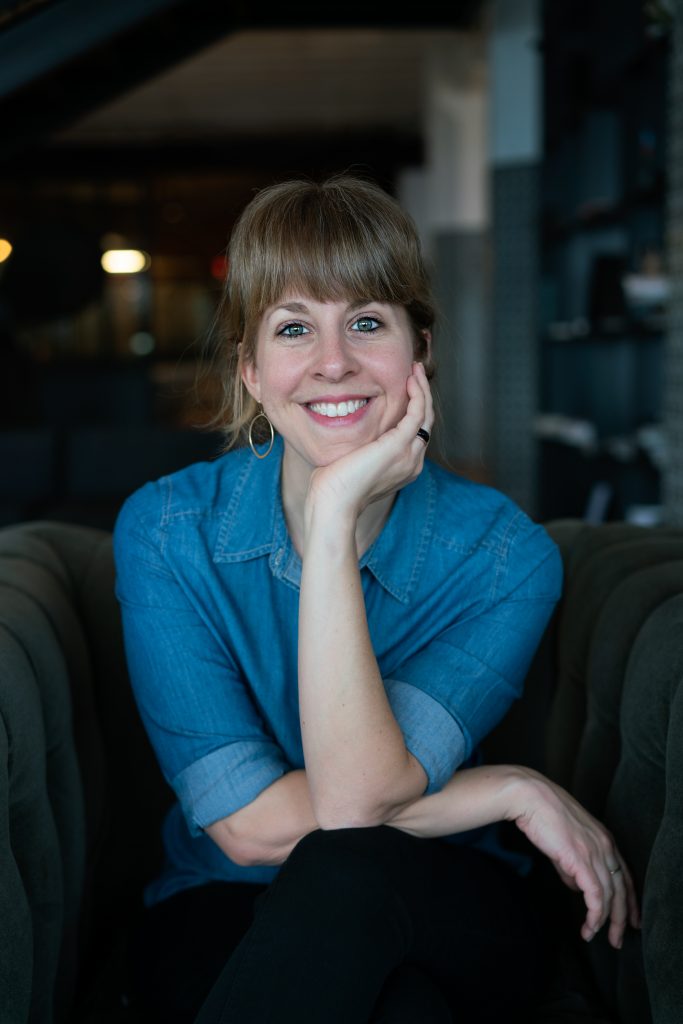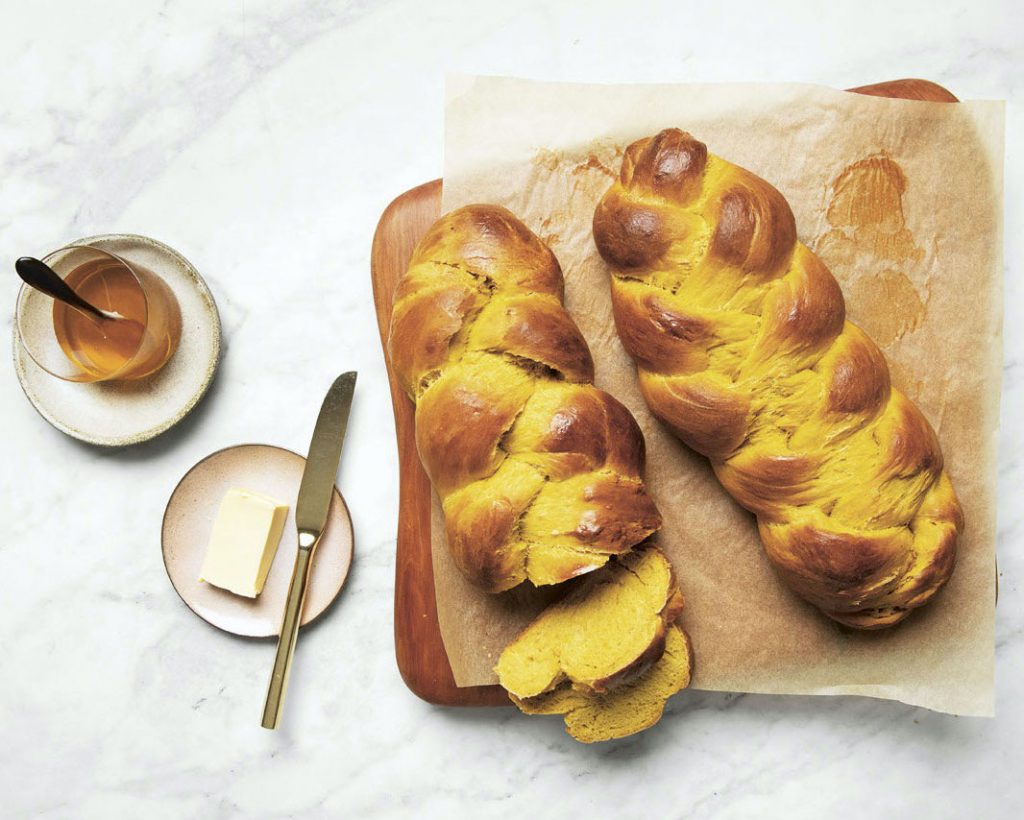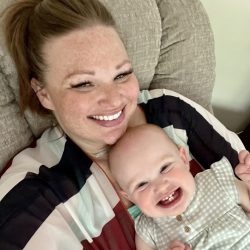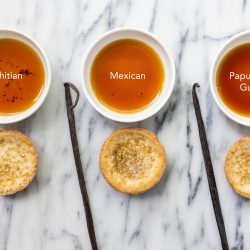In the middle of a crisis, celebrating and staying connected to traditions gives us a sense of much-needed normalcy. Leah Koenig, writer and recipe developer, will join us on September 9 to demonstrate her modern takes on North African Jewish classics just in time for Rosh Hashanah in this online, interactive class via Zoom. Save your seat today!
 Leah will bake a Yeasted Pumpkin Bread (Pan de Calabaza), a sunset-colored challah-style braid that’s particularly beautiful and perfect for serving on an autumnal Shabbat or at any fall meal. (Word on the street is the Bakehouse will sell our version of this during October.) She’ll also make a Couscous with Winter Squash and Chickpeas, to highlight the Jewish Moroccan tradition of serving couscous topped with a stew of seven vegetables on Rosh Hashanah—the number seven representing that the holiday falls on the seventh month of the Jewish calendar.
Leah will bake a Yeasted Pumpkin Bread (Pan de Calabaza), a sunset-colored challah-style braid that’s particularly beautiful and perfect for serving on an autumnal Shabbat or at any fall meal. (Word on the street is the Bakehouse will sell our version of this during October.) She’ll also make a Couscous with Winter Squash and Chickpeas, to highlight the Jewish Moroccan tradition of serving couscous topped with a stew of seven vegetables on Rosh Hashanah—the number seven representing that the holiday falls on the seventh month of the Jewish calendar.
Leah Koenig’s writing and recipes have appeared in The New York Times, New York Magazine, The Wall Street Journal, Epicurious, Food52, Saveur, Departures, More, Hemispheres, and Tablet, among other publications. Leah is also the author of six cookbooks including The Jewish Cookbook (Phaidon, 2019) and Modern Jewish Cooking (Chronicle Books).
“Koenig is an unparalleled expert in the Jewish food writing space. Leah’s work speaks for herself-over the past 15 years she’s transitioned from Jewish food writing’s lady-in-waiting to true royalty.”
—Adeena Sussman, author of Sababa: Fresh, Sunny Flavors from My Israeli Kitchen
In addition to writing, Leah also leads cooking demonstrations and workshops around the country and world. We sat down to talk to Leah about the importance of traditions, learning about different cuisines and cultures, and of course, traditional Jewish foods!
You’ll come away from Leah’s demonstration with recipes and inspiration to get cooking!
We love how you connect traditional recipes to modern times. Why do you think it’s important to reimagine traditional recipes?
I think a lot of people get this idea about traditional cuisines, particularly Jewish cuisine, that they’re monolithic and never changing. In reality, that couldn’t be farther from the truth. There is a lot of movement in Jewish history for both good and bad reasons. When people move, traditional dishes are adapted for the local produce, cooking styles of their new home. That’s why Jewish cuisine is so rich—there’s so many layers.
For me, we live in this 21st-century context in America, we shop at farmers markets, we love bright flavors. I grew up eating Eastern European dishes, and I’ve found lots of opportunities to find various expressions of these traditional dishes without changing their structure or soul. I add lemon zest, herbs, things that feel elevated and brighter. It’s a part of a larger change of Jewish culinary evolution and shows why Jewish cooking is so special.
We noticed you hosted a series of cooking demos on your Instagram in the spring. What a generous thing to do for your followers! What was that experience like?
It really came out of a sense of panic. I had all of these gigs evaporating into thin air, and I thought, I have to do something—I thought, what if I cook a few things?
I did three in a row during the first week of shutdown in New York, when everyone was hungry to connect. My son was home all day doing his schoolwork from home. Once he finished at 2 p.m., we cleared off the table, set up a makeshift kitchen, taped my phone to my husband’s mic stand, and then I’d go live. People really connected to the demos – I had some people cook along and people sent me photos. I made some money through Venmo donations, which I donated to an organization I love, and used the rest to cover the cost of ingredients.
Why do you think you were drawn to write cookbooks and host cooking demonstrations?
They go hand and hand. To me, when you’re in your kitchen developing recipes it’s very methodical, solitary work. You’re measuring everything, trying to make recipes that work for everyone. Once the book is out, the exact opposite happens—all of a sudden you have new recipes out in the world and the best way to share is to cook with people who are excited about them!
When you buy a cookbook, you might pick out 5-6 recipes to try, but if someone shows you how to make a collection of recipes from a cookbook, you may try making something that you wouldn’t have picked by yourself.
It’s a great way to connect. I always get new ideas from people at events. People will ask me things like, “My grandma used to make kugel this way, with this special ingredient, do you know if that’s traditional to where she came from?” It gives me new leads to explore! There’s always a bit of discovery that comes from doing demos. I wouldn’t have expected this, but it’s my favorite part of being a cookbook author.

How do you like to learn about different cuisines and cultures?
By cooking with people. For this book, I cooked almost exclusively with women. I found that there were some recipes I wanted to include in the book that I really needed to watch someone make. Watching people make them shows me how to explain techniques required to pull something together. Cooking with people also gives me a lot of great stories about family histories like where people moved from and holiday memories.
I also read cookbooks like historical documents. I love contemporary cookbooks and I love cookbooks from the 1950s. Even if recipes aren’t things I want to make, the context of the book tells you so much about this snapshot in time, and how people were cooking at a certain time, or to deepen understanding of one you already know.
What were your favorite Jewish dishes of your childhood?
I grew up in Eastern European Ashkenazi household. For me, that meant potato latkes every Hanukkah. My mom made delicious ones, the recipe in the cookbook is basically her recipe.
She also made homemade applesauce that was really special. She made it with red-skinned apples and left the peels on—because of that it always had a rosy pink color and a velvety texture, maybe had something to do with the pectin in the peel. It’s a rich, velvety, not-too-sweet apple sauce, though the recipe does call for a fair amount of sugar. That for me is comfort food.
My mom’s brisket was also really delicious—she would make it for Passover every year. She’d also make a composed fruit platter, using whole ingredients—sliced oranges and grapefruits, halved grapes, pomegranate seeds, pistachios, with honey on top. It was a beautifully composed, glistening, sweet, juicy, bountiful plate. In my book, The Little Book of Jewish Sweets, I tell people how she composed it. We also made Hamentashen together every year. We made the dough and helped her stuff them. Though I wasn’t interested in cooking until I got older, I always loved what she made
What is a lesser-known Jewish dish you discovered while writing The Jewish Cookbook that excited you?
There are so many I’ve discovered that are new to me. One of my favorites is a vibrant green, juicy chicken patty that comes from a Jewish community of Calcutta. Though India once had three large Jewish communities, with tens of thousands of Jewish people, many don’t live there anymore, and today the Calcutta community is gone.
I met a 90-year-old Jewish woman who grew up in Calcutta and wrote a family cookbook capturing recipes from that time, including this delicious recipe. These patties are made with chicken (or fish), broth, cilantro, ginger, garlic, jalapeño processed in a food processor, flour, and egg, and formed into a patty. The recipe is so, so good and so surprising to me – it’s not something I would have identified growing up as Jewish food. It’s a testament to how diverse Jewish food really is!
Save your seat for this demonstration today! Attendees are free to cook and bake along with Leah or can simply enjoy watching the demonstration and conversation. There will be a moderator fielding questions throughout the demonstration.
Communications Specialist for Zingerman's Community of Businesses


